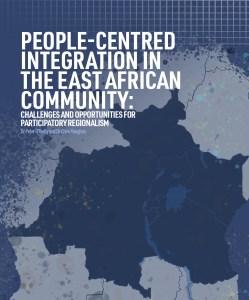SUMMARY
- The idea of people-centred integration lies at the heart of the East African Community (EAC) revival in 2000 and is considered key to overcoming the failings of prior attempts at regional integration during the 1960s and 1970s, which were viewed to be dominated by political elites.
- Various mechanisms have been established in the EAC institutional architecture to enable participation by civil society and private sector organizations across the region. This includes granting stakeholder organizations observer status to attend EAC meetings, alongside an annual forum held by the EAC secretary general.
- Associated bodies such as the East African Legislative Assembly (EALA) and the East African Court of Justice (EACJ) serve as important avenues for civil society groups and the private sector to engage, lobby and advocate for issues at the regional level.
- Despite these avenues for participation, challenges remain to realizing the vision of people-centred integration in the EAC. Official mechanisms such as observer status have proven limited due to the stringent criteria for organizations seeking to acquire it, while the Secretary General’s Forum offers very limited scope for stakeholders to meaningfully shape regional policy.
- Although interviewees speak highly of the EACJ and EALA as arenas for holding the EAC secretariat and national governments to account, both these organs have faced funding cuts and political interference in recent years that limits their capacity in this regard.
- There is an unevenness between the private sector and civil society regarding the levels of access they are afforded at the EAC. The private sector has more opportunities to participate at the EAC level due to their closer relationship with national governments – something that often eludes civil society organizations (CSOs) – and because of the centrality of economic integration to the community.
- People-centred integration is synonymous with the participation of organized civil society and the private sector. This can often limit the participation of a broader spectrum of actors from across the region.
- Many CSOs and, to a lesser extent, private sector groups are reliant on external donors to finance their engagement at the EAC. Anecdotal evidence suggests that funding for regional activities is increasingly more difficult to access as donors become more preoccupied with impact generation, which is difficult to demonstrate through participation at the EAC.
- Despite specific limitations on public participation at the EAC, its institutions still offer important spaces through which issues and grievances can be publicized. This function of the EAC has proven particularly important in recent years as civic space in some partner states is increasingly under threat.
- Although regional policymaking processes can be long and drawn out, both civil society and the private sector view engagement at the EAC as an important way to shape regional norms and standards over the longer term.
- Civil society and private sector participation in the EAC can be strengthened by: selecting more feasible criteria for organizations to acquire observer status; creating more bespoke and separate forums for civil society and private sector groups; encouraging external donors to fund regional engagement; and ensuring that a broader range of stakeholders across East Africa are able to access and participate in EAC affairs.




